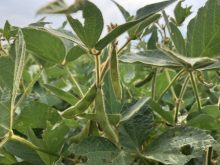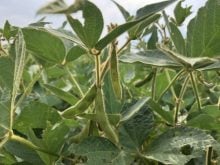The question has been asked time and again for the past three or four years: when will we see Monsanto’s Xtend technology in Canada?
The answer has been wrapped up in a long list of concerns and government procedure, but the first glint of opportunity for growers has cleared the next-to-last of a series hurdles.
The U.S. Department of Agriculture (USDA) last week announced deregulation for Monsanto’s dicamba-tolerant trait for soybean varieties, known as Roundup Ready 2 Xtend. [Related story]
Read Also

India slaps 30 per cent import duty on yellow peas
India has imposed a 30 per cent duty on yellow pea imports with a bill of lading date on or after Nov. 1, 2025.
The move clears a path for farmers on both sides of the border to be planting the varieties by 2016, with a slight amount of uncertainty pending approvals from China and the European Union.
“We still need to get some global regulatory approvals before we launch in 2016, but the USDA is another step in that process,” said Dan Wright, trait launch lead for Monsanto Canada. “Every time we get another approval it’s a big step towards commercialization.”
USDA’s decision boosts confidence that such a launch will take place — and Monsanto is using the time to increase seed production to prepare for sales to growers later this fall.
Having a timeline in hand means the company can be ready for all soybean-growing regions of the country — not just for Eastern Canada or the more southerly portions of Ontario.
“It’ll be the first soybean trait that we’re going to launch across the country,” said Wright. “We will have good volumes of product available for Ontario, Quebec, the Maritimes, Manitoba, Saskatchewan and Alberta.
“We’ve been able to use that time to get good varieties ready to go and we’ll have seed production done for each region in good quantities, not in just small quantities.”
“Multiple modes”
Monsanto said it’s been working on the Xtend trait for over 10 years. During that time, producers in Eastern Canada — specifically, Ontario — have had to learn to deal with glyphosate resistance in three different weed species: giant ragweed, Canada fleabane and common ragweed.
In the U.S., growers in some states have fought losing battles with weeds including Palmer amaranth and common waterhemp that are resistant to more than one mode of action.
“Roundup Ready 2 Extend is a very good option to control the glyphosate-resistant weeds that we have in Canada today — and on some other ones that may po -up,” Wright said.
“On giant ragweed and Canada fleabane, we get very good control with the addition of dicamba. Having a soybean trait with multiple modes of action is going to be really good.”
On the matter of Chinese and EU approvals, Wright is reluctant to provide a hard date, other than to say he believes they will come later this spring or summer.
Approvals from China in the past six months of one biotech corn trait and two other soybean traits are “a good signal that they’re continuing to approve things and haven’t come to a standstill,” he added.
While the bulk of China’s imports come from the U.S., Brazil and Argentina, a Canadian launch would hinge on Chinese approval, given the extent of trade between Canada and the U.S., as well as Canada’s own soy exports to China.
— Ralph Pearce is a field editor for Country Guide at St. Marys, Ont.













